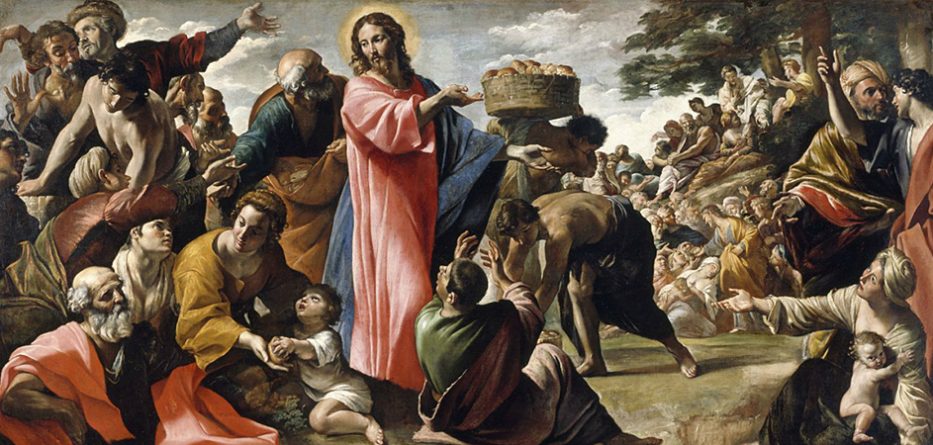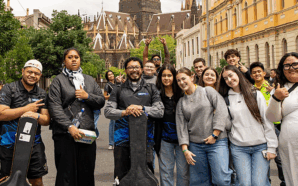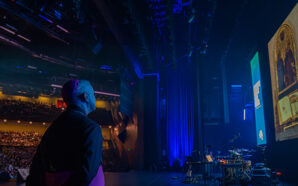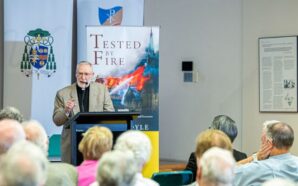Homily for the 17th Sunday in Ordinary Time
Readings: 2 Kings 4:42-44; Psalm 144; Ephesians 4:1-6; John 6:1-15
During these Sundays of Ordinary Time, we have been listening to the Gospel of Mark. For the next five weeks, we take a detour to Chapter 6 of John’s Gospel, ‘the longest complete sequence in the Fourth Gospel…held together by the motif of Jesus as “the Bread of Life” and the response this evokes from the crowds and the disciples’. There are more than 5,000 to be fed and there is nothing to work with, except the five barley loaves and two fish which the small boy has and happily hands over. Note, the boy does not keep a loaf or half a fish for himself. He gives all that he has. And Jesus works with that. Scripture scholar Brendan Byrne notes: ‘The boy who makes available to Jesus the small amount of food that he has stands in for all prepared to offer their own meagre resources to Jesus, allowing him to enhance them beyond all expectation.’ There will be 12 basket loads of scraps left over. There’s plenty for everyone.
Listen at https://soundcloud.com/frank-brennan-6/homily-28724
Years ago on a remote Aboriginal community, an artist showed me her dot painting of this gospel scene. In the centre of the painting was a large red dot. I asked whether that was Jesus, perhaps the Sacred Heart. She replied, ‘No that’s the little boy with his loaves and fishes.’ No matter what the enormity of the task we must bring what little we have but we must give it our all.
We are all troubled by the continuing war in Gaza. We all know there is very little we can do. The challenge of peace is enormous, if not impossible. It’s like trying to feed 5,000 people with five loaves and two fish. Like Philip in today’s gospel, we are tested: ‘Where can we buy some bread for these people to eat?’ ‘Two hundred denarii would only buy enough to give them a small piece each.’ Even those of us living half a world away feel that we must do whatever we can to bring about the conditions for peace, little though our contribution might be.
What to do, other than pray for peace? What to think about possible solutions?
Without dissent, the UN Security Council has affirmed ‘its unwavering commitment to the vision of the two-State solution where two democratic States, Israel and Palestine, live side by side in peace within secure and recognized borders, consistent with international law and relevant UN resolutions’.
A week ago, the International Court of Justice having ruled on the legal questions before it went on to state that the Court considers ‘that the realization of the right of the Palestinian people to self-determination, including its right to an independent and sovereign State, living side by side in peace with the State of Israel within secure and recognized borders for both States, as envisaged in resolutions of the Security Council and General Assembly, would contribute to regional stability and the security of all States in the Middle East.’
The Australian judge on the court, Hilary Charlesworth reflecting on Israel’s expansion of settlements on the occupied West Bank, wrote: ‘[T]he longer time passes, …the less plausible it is that the continued occupation of an entire foreign territory is a necessary and proportionate measure in response under the right to self-defence. This is especially the case where this occupation extends to the entire territory over which a population exercises its right to self-determination.’
Meanwhile the war in Gaza drags on with an inordinate number of civilian casualties. Prime Minister Netanyahu addressing the US Congress during the week was unbowed, claiming, ‘This is not a clash of civilizations. It’s a clash between barbarism and civilization. It’s a clash between those who glorify death and those who sanctify life.’ Convinced of the rightness of his cause, he declared: ‘For Israel, every civilian death is a tragedy. For Hamas, it’s a strategy. They actually want Palestinian civilians to die, so that Israel will be smeared in the international media and be pressured to end the war before it’s won.’ He did his own bit of smearing, casting aspersions on those demonstrating against his presence in the Congress: ‘For all we know, Iran is funding the anti-Israel protests that are going on right now outside this building—not that many, but they’re there—and throughout the city. Well, I have a message for these protesters: When the Tyrants of Tehran, who hang gays from cranes and murder women for not covering their hair, are praising, promoting and funding you, you have officially become Iran’s useful idiots.’
On Friday, our Prime Minister Anthony Albanese joined with his fellow prime ministers from Canada and New Zealand ‘on the need for an urgent ceasefire in Gaza’. Even handedly, they said: ‘We remain unequivocal in our condemnation of Hamas for the atrocities of October 7 and ongoing acts of terror. Hamas must lay down its arms and release all hostages. We see no role for Hamas in the future governance of Gaza. Israel must listen to the concerns of the international community. The protection of civilians is paramount and a requirement under international humanitarian law. Palestinian civilians cannot be made to pay the price of defeating Hamas. It must end.’
They pledged their countries to what they regard as the only conceivable path to peace: ‘We are committed to working towards an irreversible path to achieving a two-state solution, where Israelis and Palestinians can live securely within internationally recognised borders. This is the only realistic option to achieve a just and enduring peace.’
No matter how fervently we pray for peace, we know that at this stage our prime ministers are just as powerless as us in bringing that peace; not even the UN Security Council and the International Court of Justice can enforce peace. A two state solution requires two states committed to peace and security for the other.
Like the boy with his five loaves and two fish, we give our all, hoping for peace. Like Philip, we ask what we can practically do?
Coming to the altar, we share the bread of life, with the faith that Jesus gives us as much as we want, with plenty left over, and with the hope that Jesus will transform our own meagre resources enhancing them beyond all expectation.
The hand of the Lord feeds us; answering all our needs.
The eyes of all creatures look to you
and you give them their food in due time.
You open wide your hand,
grant the desires of all who live.
The hand of the Lord feeds us; answering all our needs.
The Lord is just in every way
and loving in all deeds.
The Lord is close to all who call,
who call from their hearts.
The hand of the Lord feeds us; answering all our needs.
[1] Brendan Byrne, Life Abounding, St Pauls, 2014, p. 108
[2] Ibid, p. 114.
[3] UN Security Council resolution 2735 (2024), 10 June 2024.
[4] See https://www.icj-cij.org/sites/default/files/case-related/186/186-20240719-adv-01-00-en.pdf, para 283
[5] See https://www.icj-cij.org/sites/default/files/case-related/186/186-20240719-adv-01-10-en.pdf, para 27
[6] See https://www.timesofisrael.com/were-protecting-you-full-text-of-netanyahus-address-to-congress/
From the start of 2024, Fr Frank Brennan SJ will serve as part of a Jesuit team of priests working within a new configuration of the Toowong, St Lucia and Indooroopilly parishes in the Archdiocese of Brisbane. Frank Brennan SJ is a former CEO of Catholic Social Services Australia (CSSA). Fr Frank’s latest book is An Indigenous Voice to Parliament: Considering a Constitutional Bridge, Garratt Publishing, 2023 and his forthcoming book is ‘Lessons from Our Failure to Build a Constitutional Bridge in the 2023 Referendum’ (Connor Court, 2024).








